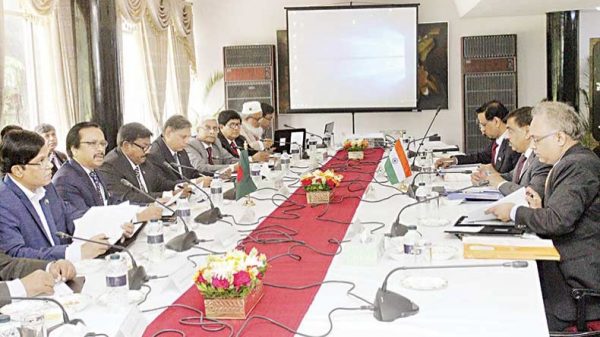India wants more time for Ganges Barrage study

Shawdesh Desk:
India on Thursday pressed for unspecified time for conducting an elaborate study on maximising benefit from the construction of Ganges Barrage in Bangladesh.
At a meeting of the water secretaries of the two countries, Bangladesh agreed to grant the next door neighbour more time for completing the study with expanding a joint study group formed for assessing scopes on construction of the barrage.
‘We have decided on expanding the joint study group by taking more experts from both sides and allowing the group to set terms of references for the group,’ Indian water secretary UP Singh said at a joint press briefing after a meeting with his Bangladesh counterpart in Dhaka.
He claimed that India has no problem in constructing the Ganges Barrage. ‘It is “no issue” to us… but we want to see how to maximise the benefit on both sides of the borders,’ he added.
Replying to a question what the existing bilateral committee had done so far in the last several years, he said the committee did ‘some works’ including visiting the proposed site of construction in Bangladesh.
The two secretaries have, however, said the two sides would synchronise their data on seven rivers, including the River Teesta, by September 30 with a possibility of signing either an interim agreement or a framework agreement at the earliest.
On the possibility of signing of an agreement on sharing of Teesta River water, Singh said, ‘We have only a few things to be done.’
Asked whether the agreement would be signed during Bangladesh prime minister’s visit to India in October, Singh said, ‘We have not been to that stage.’
Replying to the same question, Bangladesh water secretary Kabir Bin Anwar said, ‘It isn’t finalised yet.’
Anwar said they discussed the possibility of signing of either interim or a framework agreement on water sharing of seven rivers including Teesta River.
The two sides agreed for ‘general cooperation’ in the water sectors including basin-wide management of common rivers in the Padma, the Jamuna and the Meghna basins.
He said, ‘There is a possibility of holding a meeting of the Joint Rivers Commission at the level of water resources ministers soon.’
The two secretaries have, however, expressed their satisfaction for holding a meeting at their level after more than an eight-year break. The last secretary-level meeting was held in June 2011.
India has been holding the chairmanship of the ministerial-level commission since 2010 in violation of Article 3 of the statute of the Indo-Bangladesh Joint Rivers Commission, which says, ‘The chairmanship of the commission shall be held annually in turn by Bangladesh and India.’
Bangladesh has sent at least 10 letters to Indian authorities since second half of 2010 for a water ministers-level meeting but got no positive response from the next door neighbour.
Chapter V of the statute says, ‘The ordinary sessions of the Commission shall be held as often as necessary, generally four times a year. In addition special meetings may be convened any time at the request of either government.’
Successive Indian prime ministers — Manmohan Singh and Narendra Modi — kept promising to conclude agreements on sharing of waters of seven transboundary rivers, Teesta in particular, in spite of requests of Bangladesh prime minister Sheikh Hasina on almost every occasions they met.
After the finalisation of the draft of the Teesta instruments by the two sides, India backtracked on the signing several hours before the arrival of Manmohan Singh in Dhaka on September 6, 2011, on the plea that the West Bengal chief minister, Mamata Banerjee, objected to the government’s decision.
Mamata is yet to give a green signal on the signing of the deal, a Bangladesh diplomat in Kolkata said on Sunday.
According to the framework of an interim agreement finalised in 2010, the two sides agreed to share Teesta water on fair and equitable basis on a 50-50 water sharing ratio after keeping 20 per cent of Teesta waters as environmental flow during lean season.
In April 2017, the two prime ministers also directed concerned officials to conclude the discussions on various aspects relating to sharing of waters of the Feni, Manu, Muhuri, Khowai, Gumti, Dharla and Dudhkumar rivers, according to the joint statement published on April 8, 2017 on official visit of Bangladesh prime minister to India.
Bangladesh completed a feasibility study in 2013 for construction of the Ganges Barrage on Padma River at Pangsha of Rajbari. The government had stopped the process as India has sought a fresh study on impacts of the barrage on Indian side.
Bangladesh has, however, gave consent as ‘a good gesture’ at technical levels, without signing any formal agreement, for withdrawal of water from the River Feni for supplying to Belonia town of India, officials said.
The last minister-level JRC meeting was held in March 2010 in India. It was the 37th meeting of the commission founded in 1972.
India and Bangladesh share at least 54 transboundary rivers on which agreement has been reached only on sharing of water of the River Gangaes, which flows into Bangladesh assuming the name Padma, based on a sharing formula of the flows measured at Farakka during the lean season each year, between January 1 and May 31. The 30-year treaty signed in 1996 is renewable by mutual consent.
Bangladesh also shares Sangu, Matamuhuri and Naf rivers with another of its neighbour — Myanmar.























Leave a Reply